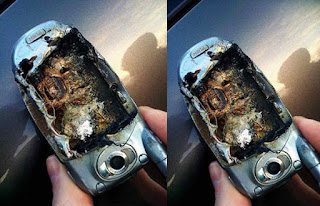--AD--
When Samsung unveiled the Galaxy Note 7 smartphone back in
August, with its much-lauded battery life, the South Korean firm looked like it
was on top of the game -- until the phones started exploding making people to start seeing the phone as a potential explosive.
Initially, the tech giant cited "battery cell
issues" as the cause of the explosions in September and provided a replacement which was deemed safe but all didn't go well as the replacement also started bursting into flames. since then, consumers have been worried on the cause of the
fault since Samsung hasn't been able to give a clear statement after the final recall that even came with a $100 reward.
Although, Samsung has announced a permanent end to production of the troubled smartphone on Tuesday. Many consumers have been left wondering if they are safe with Lithium ion batteries. Here's what you
need to know:
What is a lithium-ion battery?
Batteries are containers that can convert chemical energy to
electrical energy through the transfer of electrons from the negative plate --
or anode -- at one end of the battery to the cathode -- or positive plate at
the other end.
But traditional batteries have a limited number of units of
convertible chemical energy. The difference with the lithium-ion battery is
that it is rechargeable -- a game-changer in tech innovation.
Steve Levine, author of The Powerhouse: Inside the Invention
of a Battery to Save the World explained that it "triggered this whole
electronics revolution starting in the beginning of 1990s until today. It has
enabled the iPhone, medical devices, wearables, iPads, our thin laptops -- all
of that is because of the lithium-ion battery.
"Lithium is the lightest metal in the world which is
why they use it but it is also extremely volatile, Almost every laptop on the
planet, almost every smartphone is a standard formulation which is cobalt-oxide
and lithium. But then there are competing formulations."
Samsung won't be the last to have exploding batteries
So why do some Phones explode?
Levine says speculation among researchers suggests that the
battery manufacturing process could be the source of the smartphone fires, but
ultimately no one knows. And the lack of information creates consumer anxiety
which could ripple out to the wider electronics industries.
"It potentially tarnishes all the manufacturers,"
said Levine. "How do we know that Apple or the new Google phone is not
going to have the same problem?"
However, some experts say the fact the high-end phone has
been discontinued points towards a design flaw.
"The discontinuation signals that the root of the
problems does not lie in the production errors, but possibly in the product
design," TuanAnh Nguyen, a research analyst at Canalys told CNNMoney.
Could manufacturing be the problem?
This is by not the first time lithium-ion batteries have hit
the headlines.
Although the Samsung phone's battery is different to those
in airliners, Boeing faced similar issues with lithium-ion batteries in their
Dreamliner aircraft. Their entire global fleet was grounded in 2013 after
multiple instances of overheating batteries in Boston and Tokyo.
Investigations by the National Transportation Safety Board
determined that manufacturing defects and allegedly unsatisfactory oversight of
the manufacturing of the batteries by both the FAA and Boeing were the root
causes of the incidents.
At least two fatal cargo jet crashes are believed by
investigating authorities to have been caused by fires on board as a result of
these lithium-ion batteries. In 2010, a Boeing 747 crashed in Dubai, killing
two crew members while an Asiana Airlines 747 crashed off South Korea the
following year, also killing two crew members.
Are consumers in danger?
No, according to Levine, who says consumers are not at
immediate risk from phones in their pockets blowing up.
He said: "We know right now that the problem has been
confined to this one model... that it hasn't been something that has risen
chronically, at least in any other Samsung device, [or] at any other
manufacturer.
"So the quick answer is that [consumers] shouldn't be
concerned but that doesn't mean they won't be."
Source: CNN
Got anything to add to this post? Tell us via comments


Comments
Post a Comment
Important - If you ask a question make sure you tick the "Notify Me" box below the comment form to be notified of follow up comments and replies.